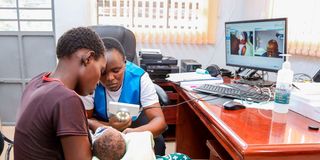Why the women of Tiaty keep off family planning services

Marigat Catholic Mission Hospital clinical officer Peris Tomno examines a baby.Thousands of women in Baringo villages have disregarded family planning services for fear of being beaten up or left by their husbands.
What you need to know:
- Elders from the region categorically state that they invested a lot in paying dowry to their wives, whose responsibility is to sire many children in return.
- Asiroi Loitamedo from Napeikore said he paid more than 40 goats, 20 cows and six camels for each of his three wives as dowry.
Maua* would rather die than have her husband know that she visited a dispensary for family planning or antenatal care.
A resident of Tiaty East in Baringo County, she once sought medical attention while pregnant. What followed was a beating from her husband.
Maua, 30, is a mother of nine. She was married at the age of 17. During her first pregnancy, she did not understand how much her husband detested the “soft” habit of seeking healthcare from formally trained medics. There, women are supposed to be attended to by traditional birth attendants.
So, during that first pregnancy, she went for antenatal services at the Riong’o Dispensary, which is not too far from her matrimonial home. This was after she had a bout of malaria in her second trimester.
“When I went back home from the health facility, to my dismay, I got a thorough beating from my husband who was categorical that in case of any problem, I should seek the services of a traditional birth attendant instead. He warned against ‘colluding’ with the health workers to get any family planning services. I obliged for fear of my life,” said Maua.
“In our community, women are supposed to sire as many children as they can. I am the third wife with nine children and it’s my responsibility to feed and fend for them. It is not easy, but do I have a choice? I don’t,” added the distraught woman, adding that two of her children are suffering from malnutrition.
Her story is replicated in some remote areas of Baringo. Health workers in remote villages in Tiaty East and Tiaty West sub-counties are still grappling with the challenge of educating locals on the importance of family planning.
This has been worsened by high illiteracy levels in the area, where any woman who opts for the services is regarded as an outcast who cannot bear children anymore. Thousands of women have disregarded the services for fear of being beaten up or being divorced by their spouses.
In some areas, it is an abomination if a woman goes more than a year without conceiving. It may prompt the elders to question if she in any way sought family planning services.
“In our community, when your baby is six months old, you are ripe to carry another pregnancy. Women are respected and adored if they have many children, who are seen as a symbol of wealth. They will start questioning if you stay for more than a year without getting pregnant and that will warrant a thorough beating for suspicion of being under contraceptives,” said Ms Chepkorkor Kamama of Natan village.
Birth control methods, she said, are linked to bareness “and no one would want to be associated with such and there is no way we can go for the services without consulting our husbands, who are the major decision makers”.
Elders from the region categorically state that they invested a lot in paying dowry to their wives, whose responsibility is to sire many children in return.
Asiroi Loitamedo from Napeikore said he paid more than 40 goats, 20 cows and six camels for each of his three wives as dowry.
“Why should I negotiate with a woman on how many children she should bear? Their responsibility is to sire as many children as they can, and what is the motive for spacing children anyway? In fact, getting them pregnant every year is a way of also taming them to not be promiscuous and look after children at home,” retorted Mr Loitamedo.
According to the elder, if a woman cannot fulfil her responsibility of bearing many children, then she has no use and is better off going back to her parents.
However, health workers in the area have raised concern that the low uptake and use of birth control drugs and methods have led to increased cases of malnutrition due to a lack of food because most of them cannot afford to feed the many children, with most families depending on one meal for survival.
This has exposed most of them to increased maternal deaths associated with birth complications due to poor spacing of children and most of them do not attend ante-natal clinics.
In Tangulbei Sub-county, which covers a radius of more than 50 kilometres, they receive only 15 to 20 women who seek family planning services a month.
The facility serves locals from Tangulbei, Kasitet, Chemakit, Soromia, Bombo, Kadokoi Lomerimeri among others.
Magdaline Katikit, a health worker in the region, said many women avoid going to antenatal clinics for fear of being convinced to embrace birth control methods.
“The few who come to the facility for clinics only attend the first and second trimesters. During the third trimester, they seek the services of traditional birth attendants so that they don’t give birth in a health facility and are introduced to family planning services,” said Ms Katikit.
“The low uptake has led to high cases of malnutrition among children below the age of five years due to poor spacing.”
Recently, the facility admitted five children suffering from acute malnutrition, with tens of others under treatment.
According to the health workers, men in the community decide if their wives should get the services or not, and any suspicion that their spouses sought the services would not be secure to them as well. “The problem is that the same men would not want to accompany their wives to get reproductive health education. In this community, you cannot do that behind their backs because you will also be in trouble. This is a male-dominated community and anything they say is final,” said the health worker.
At Chemolingot Sub-County Hospital, which serves a radius of 100 kilometres, medics are still grappling with the challenge. In January for instance, 23 women went for the service. In February, the records also show that 27 women sought the service and 37 in March respectively.
“We still have a big challenge of family planning uptake in this region owing to cultural believes, high illiteracy levels and a shortage of drugs. For instance, for the last six months, the pills have been out of stock,” said a medic who sought anonymity for fear of victimisation.





